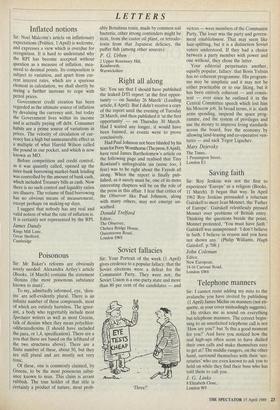Soviet fallacies
Sir: Your Portrait of the week (1 April) gives credence to a popular fallacy: that the Soviet elections were a defeat for the Communist Party. They were not; the Soviet Union is a one-party state and more than 80 per cent of the candidates — and `Three?' victors — were members of the Communist Party. The loser was the party and govern- ment establishment. That may seem like hair-splitting, but it is a distinction Soviet voters understood. If they had a choice between a party member with power and one without, they chose the latter.
Your editorial perpetuates another, equally popular, fallacy: that Boris Yeltsin has no coherent programme. His program- me may be simplistic and it may not be either practicable or to our liking, but it has been entirely coherent — and consis- tent — ever since he outlined it in the Central Committee speech which lost him his Moscow job. In broad terms, it is: slash arms spending, suspend the space prog- ramme, end the system of privileges and use the money to improve living standards across the board, free the economy by allowing land-leasing and co-operative ven- tures — and sack Yegor Ligachev.
Mary Dejevsky
The Times, 1 Pennington Street, London El


















































 Previous page
Previous page